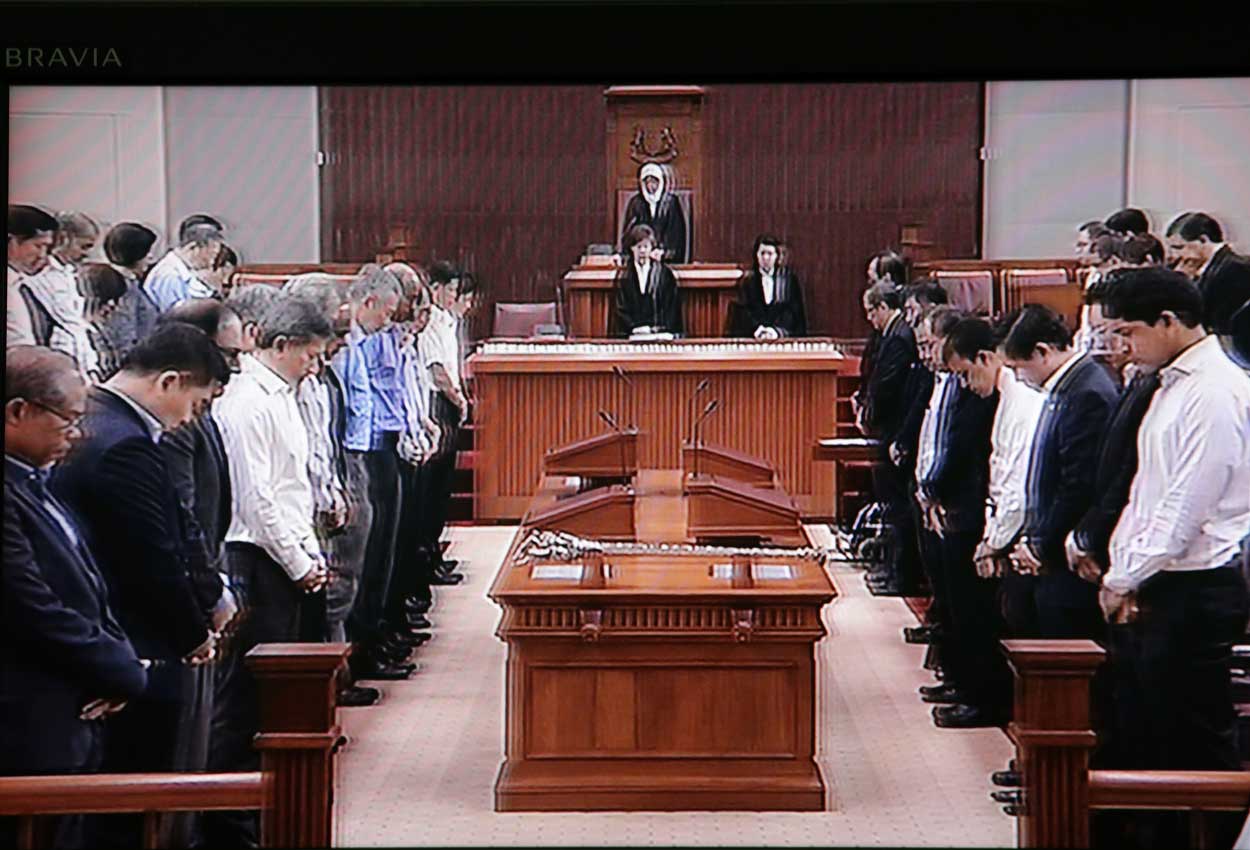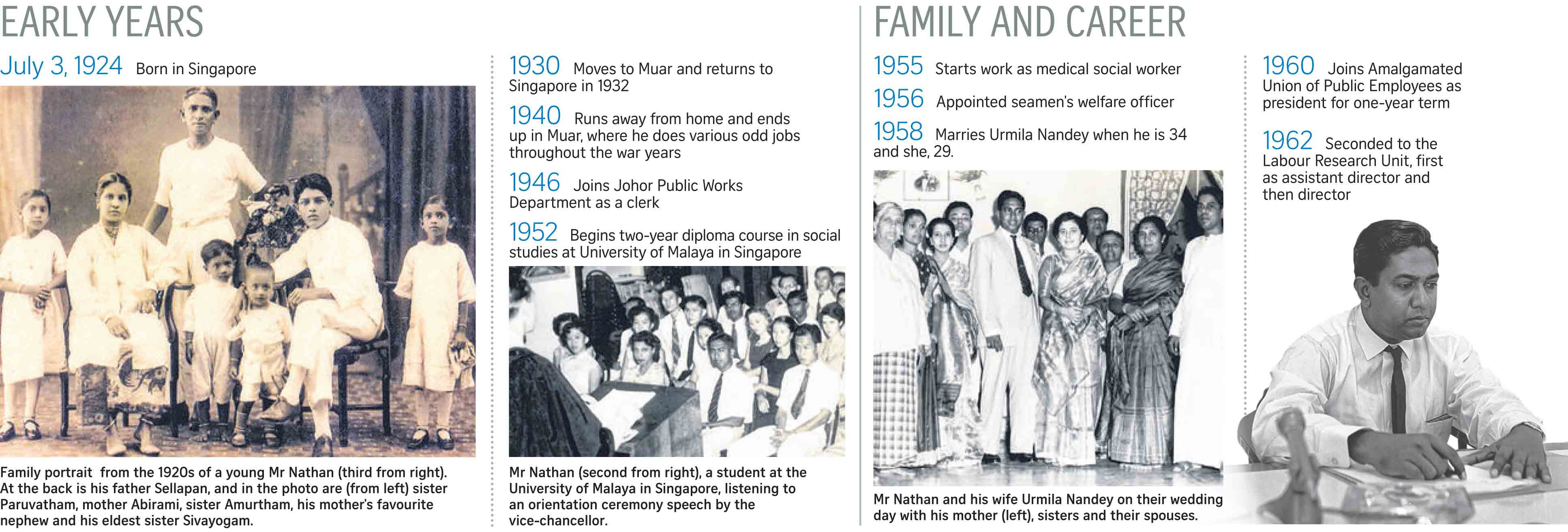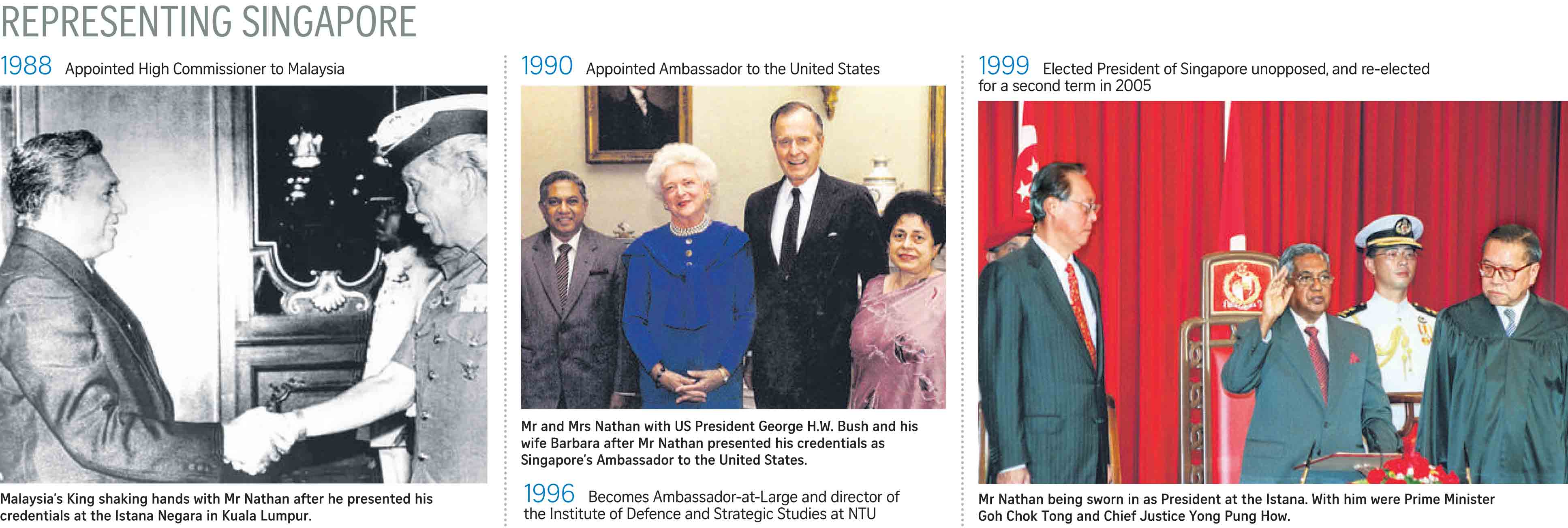When some statutory board officials and businessmen left early instead of staying on for networking sessions at the end of a 2009 state visit, then President S R Nathan’s message to them was “far from serene”, Mr Christopher de Souza (Holland-Bukit Timah GRC) recalled yesterday.
Mr de Souza, who was present, remembered Mr Nathan saying: “You may think the socials are unimportant, but they are important. Staying back, discussing and engaging with your host is how we make Singapore relevant.
“I have come here to do that. Send this message back to those who left the trip early.”
This anecdote from a state visit to Istanbul was among several personal encounters related yesterday by nine members of the House during a parliamentary tribute to Mr Nathan who died last month, aged 92.
It took place at the start of the sitting, with Speaker of Parliament Halimah Yacob celebrating the life of Singapore’s sixth and longest-serving president by charting his career from a social worker to the highest office in the land.
Her personal memory was Mr Nathan’s handwritten note to her after she became Speaker in 2013. He shared his and his wife’s joy at her appointment, and his prayer that “God will be with you as you undertake your new responsibilities”.
Said Madam Halimah: “Such was the measure of the man. He had walked among kings and presidents but he remained fully rooted to the ground, never losing his bearings and keeping his humanity to the end.”
Her voice wavering, she added: “The House records with deep regret the passing of one of our esteemed sons of Singapore, Mr S R Nathan.”
Mr de Souza’s story held a special meaning for the MP. It illustrated how the late Mr Nathan – like pioneers Lee Kuan Yew, Goh Keng Swee and Hon Sui Sen – led by example and gave the nation his all.
For Mr Nathan, nothing less than one’s best was sufficient when on national duty, he said.
“That is what standard bearers do – they maintain standards for a cause. Mr Nathan’s cause was Singapore.”
Mr Nathan’s wife Urmila, children Juthika and Osith, and grandson Kiron were present for the tributes, at the end of which the House observed a minute of silence.
The stories told had a common thread in how he touched the many groups he encountered.
Speaking in Mandarin, House Leader Grace Fu noted the close relationships he had with the Chinese community. He attended many cultural festivals and had a talent for Chinese calligraphy, she said.
Ms Rahayu Mahzam (Jurong GRC) said in Malay that Singaporeans could learn three things from Mr Nathan: the desire to upgrade oneself, eagerness to inculcate knowledge in the next generation, and concern for all around him.
Unionist Desmond Choo highlighted his enduring impact on the labour movement, including modernising unions that led to more efficient collection of union dues and standardised subscription rates.
Other speakers included Workers’ Party chairman Sylvia Lim (Aljunied GRC), Mr Murali Pillai (Bukit Batok) and Nominated MP Chia Yong Yong.
Mr Pritam Singh (Aljunied GRC) recounted how he ended up sitting with the former president at a Lions XII football game in 2013.
At one point when the Lions XII nearly conceded a goal, Mr Nathan pointed out to Mr Singh the Lions XII player who lost possession earlier and thus allowed the opponents to create a chance to score.
Said Mr Singh: “In a very different context and rather unanticipated way, I bore witness to his eye for detail and his ability to focus on the issues that mattered, traits for which he was widely known for in public service.”
RICH DIPLOMATIC EXPERIENCE
On one such occasion, one person in the lunch group was sharing some observations he made about political leaders in another country he had just visited. This person concluded that one of the ministers there was not up to the mark as the minister had remained silent throughout an official meeting with Singapore’s high-level delegation.
This drew a swift rebuttal from President Nathan, who proceeded to give all of us a primer about the way governmental power was organised in that particular country, and why a minister there would deliberately remain silent in certain contexts.
By the time lunch was over, President Nathan had not only shown his depth of world view, but also simultaneously put some of us in our places. Diplomatically, of course.
– WORKERS’ PARTY CHAIRMAN SYLVIA LIM (ALJUNIED GRC), on the late S R Nathan’s wealth of diplomatic experience, which he shared during small group lunches at the Istana.
PUTTING NATION FIRST
When I met him at the Singapore General Hospital, the first thing he asked me was, ‘How much time do you have for me?’ I have never seen anyone else with such humility. I told him I was in his hands and he could take as long as he liked.
After I sat down, he presented to me a bottle of savoury Indian bites. He told me Mrs Nathan specially prepared this for my wife Gowri, whom she learnt was a fellow teacher. I was immediately put at ease by his kind gesture.
I then noticed that, to his right, he had a two-page handwritten note entitled ‘Points to cover with Murali’. He had obviously made preparations in advance of the meeting.
This was a man who had spent the better part of his life serving Singapore and Singaporeans. He was unwell at the last leg of his life, yet he took the trouble to spend his time talking with me about issues our nation faced.
– MR MURALI PILLAI (BUKIT BATOK), on his first meeting with Mr Nathan two months ago.
EXTREME SELFLESSNESS
Great is the man remembered for his legacy, above his achievements. Greater is he remembered for his goodness, above his legacy. Mr Nathan was such a man…
When Mr Nathan was honoured by the Social Innovation Park as an SIP Distinguished Fellow in 2014, he was asked why he volunteered to be one of the hostages for the terrorists in the Laju hostage incident. Did he not fear for his own safety? Did he not worry for his family with young children? How heroic!
From his wheelchair, his reply was matter of fact, understated, and brief. He said he was not a hero. There was no time to lose, the stakes were high; you had to do what you had to do.
– NOMINATED MP CHIA YONG YONG, on Mr Nathan’s selflessness.
TAKING THE LEAD
In the 60s, Dr Goh Keng Swee was trying to attract foreign investment. Assisting Jurong Shipyard, a joint venture involving Japan’s Ishikawajima-Harima Industries and the Economic Development Board, Mr Nathan negotiated to establish a fair and efficient wage structure.
Without any precedent, he combed through countless collective agreements filed with the Industrial Arbitration Court to work out a structure that both the union and employers accepted.
This structure paved the way for properly regulated working conditions and terms of employment for workers. It laid the foundation of wage structure, applicable even today.
This episode shifted the labour movement’s mindset. Our union leaders realised that they had a vital role to play in the economic growth of Singapore.
– UNIONIST DESMOND CHOO (TAMPINES GRC), on how Mr Nathan initiated many labour union moves, despite not having any precedents to rely on.

This article was first published on September 14, 2016.
Get a copy of The Straits Times or go to straitstimes.com for more stories.














































































